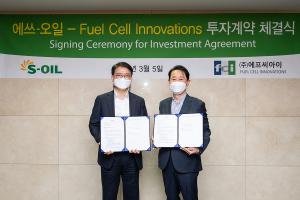Securing a 20% stake in the solid oxide fuel cell company’FCI’ New business for future growth… “Responding to government carbon reduction efforts”

S-OIL enters the hydrogen business by investing in the next-generation fuel cell company, the core of the hydrogen economy.
S-OIL announced on the 7th that it has signed an investment contract with FCI (Fuel Cell Innovations), which provides clean energy solutions based on fuel cells.
S-OIL will become the largest shareholder in Korea by securing a 20% stake as an initial investment in FCI, and plans to establish a strategic partnership to enter the hydrogen industry and promote the hydrogen business.
A fuel cell is a device that generates electricity by chemically reacting hydrogen with oxygen in the air, and is a key device in the hydrogen economy.
CEO Al Qatani said, “This investment is expected to lead the company’s sustainable growth as the start of investment in the overall hydrogen economy.” “We will actively respond to the carbon reduction efforts promoted by the government.”
FCI, a Korea-Saudi joint venture with more than 40 solid oxide fuel cell patents, collaborates with various companies and research institutes to develop products suitable for Korean and overseas markets with Solid Power, an Italian fuel cell company, for open innovation. Are building.
With this investment, FCI plans to build a production facility of more than 100MW through an investment of up to 100 billion won by 2027 and expand its business area to the green hydrogen business.
Together with S-OIL, FCI is promoting not only domestic but also overseas fuel cell markets including the Middle East market.
In particular, it has plans to supply products to Saudi power companies and telecommunications companies through cooperation with Saudi partners.
Currently, FCI is developing products for power generation and buildings that meet the climate conditions and legal regulations of the Middle East market based on the first 150MW fuel cell supply contract from a Saudi partner. It is jointly developing microgrid type convergence products and marine fuel cells to be applied to ships with major organizations.
FCI CEO Taewon Lee said, “The Middle East market is an attractive market as fuel cell power generation can reach grid parity without government subsidies due to its high gas price competitiveness. “I am looking forward to synergies with S-OIL.”
In order to achieve the new growth strategy’Vision 2030′, S-OIL is maximizing the profitability of the existing oil refining, petrochemical, and lubrication businesses, while actively considering advancing into new business fields such as fuel cells and recycling.
In particular, S-OIL is planning to enter the entire hydrogen industry as one of the new business fields, from production to distribution and sales of hydrogen. To this end, S-OIL is reviewing the business using green hydrogen and green ammonia, and the production and distribution of liquefied hydrogen through cooperation with Saudi Aramco, a major shareholder. In addition, it is considering introducing a complex hydrogen charging station in downtown Seoul, and recently, it is participating in a special purpose corporation, Kohaizen, promoted by related industries to build hydrogen charging infrastructure for buses and trucks. Reporter Kim Ji-eun
Copyright holder © Ulsan Jeilbo Unauthorized reproduction and redistribution prohibited
